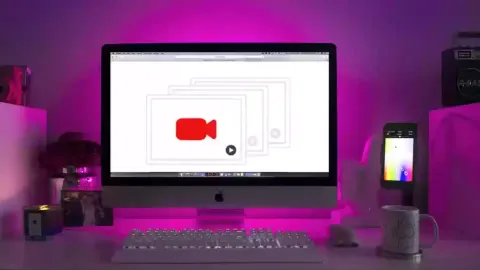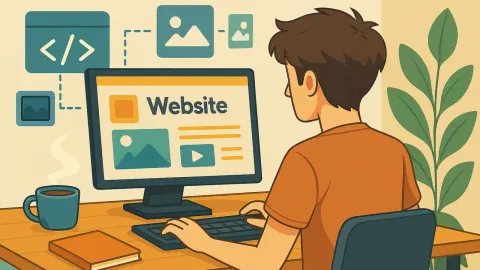How to Attract Customers in Early Startup Phase? Key Website Design Strategies for Building Trust

Quick Answer
Key strategies for attracting customers through website design in early startup: clearly communicate brand value and vision, showcase product/service advantages, establish professional image, provide customer testimonials, optimize user experience, build trust. Your website should become a 24/7 brand story.
From Handing Out Flyers to Web Design: Understanding What 'Attracting Attention and Building Trust' Really Means
I still remember my first “marketing task” as a student - handing out tissue paper advertisements outside a supermarket. I stood there for an entire afternoon with a frozen smile on my face, but could barely hand out a few flyers.
Most people walked by with their heads down, hurrying past. The few who took them only did so because there was free tissue paper attached. Among these, only a very small number were actually interested in the content and were effective target customers.
At that time, I thought to myself:
Why is it so hard to be noticed despite trying so hard to be seen?
Years later, I entered the web design industry. After starting work and helping some early-stage brands build websites, I truly understood that entrepreneurs don’t lack passion - they lack a way to “make people willing to stop.”
A good website can help you turn flyers into a 24/7 brand story that attracts the right people to stop and carefully learn about you.
As a professional website design team, we understand deeply that a good website is not just about showcasing products - it’s the starting point for building trust and attracting customers in the early stages of entrepreneurship.
The Real Key to Making People Stop
Imagine you’re running a cake shop. Among so many shops, why would customers choose you?
But if your website showcases your unique story, brand philosophy and dedication, or your attention to product details, shares positive reviews from past customers, photos of delicious meals being enjoyed, and even the convenience of online ordering, then customers will be more easily attracted to you, understand you, trust you, and even become loyal customers.
I later realized that “making people stop” isn’t about forcing others to look at you, but making them want to actively learn about your brand out of curiosity, trust, or need. Because what really makes people willing to stop isn’t what you “force on others,” but what makes them “actively want to understand you.”What Early Startups Need Most Isn't Promotion, But Trust
If you’re starting a business, you might be facing these situations:
- Finally completed your product, but don’t know how to showcase it externally
- Been running social media for months, but no inquiries or conversions
- When friends ask “Where’s your website?” you can only say: “Still thinking about it”
According to statistics, 80% of consumers check a brand’s website before making a purchase. If your website isn’t ready, you’re missing these opportunities.
Would you rather place an order through a social media channel that only invites you to order and transfer money, or through a platform that carefully introduces products and completes orders through third-party payments?
A website is often the best spokesperson for early-stage startupsFour Things a Website Helps You Communicate Clearly
A good website isn’t for showing off, but to help you clearly communicate:
- Who are you?
- What services do you offer?
- What problems can you solve?
- Why would customers choose you?
This can’t be accomplished with just a few short sentences on social media. In social platforms flooded with cluttered ads and short videos, you need a place to tell your story properly.
And that place is your brand’s website.
Web Design Isn't Just About Aesthetics: Helping Startup Brands Create Effective Website Experiences
Have you ever wondered why some restaurants are packed while others are empty?
Your Website Is Like a Store’s Storefront
When people pass by and see a store with a clear style that feels comfortable and attractive, they’ll be willing to step inside. If the flow inside is chaotic, information is unclear, and they can’t contact you - even if your products are great, they’ll just turn around and leave.
Truly effective website design includes:
- Visual style consistent with brand
- Clean and attractive content presentation
- Clear action paths and user experience design
- Guided narrative, from “browsing” to “trust”
These aren’t just about aesthetics, but a combination of psychology and strategy.
Effective Website Design Elements Demo
Four Key Elements of Effective Website Design
From colors to fonts, from layout to image style, everything should clearly convey your brand personality, letting visitors immediately feel your professionalism.
Not putting all information up, but displaying with focus and hierarchy, allowing visitors to quickly find the information they want.
Clear navigation, simple operation flow, letting visitors easily complete the actions they want: understand, contact, purchase.
From “who you are” to “why choose you,” use storytelling to guide visitors step by step to build trust in you.
I Know You've Been Working Hard and Preparing for a Long Time
Ready to let your brand be seen?
Maybe you’re still thinking: “Is it too early to build a website?”
But what I want to say is:
Precisely because it’s early stage, a clear website can help you build trust and attract your first customers.Starting Simple Is Enough
This website doesn’t need to be large, or even have many pages. But it must clearly communicate your brand story, values, and services.
We can start with simply telling your story:
- An attractive product introduction
- A compelling philosophy that convinces customers
- Clear contact information
Such a website doesn’t need to be large, but it lets people see that you’ve “seriously started”
Startup Website Essential Elements Checklist
Startup Website Essential Elements
Brand Story & Philosophy Essential
Clearly explain “who you are” and “why you started this business,” allowing visitors to understand and identify with your brand philosophy.
Product or Service Introduction Essential
Showcase your products or services in an attractive way. The focus isn’t a feature list, but what problems you can solve for customers.
Contact Information & Methods Essential
Provide multiple contact methods: phone, email, social media, so interested customers can easily reach you.
Customer Testimonials or Portfolio Recommended
Even in early stages, you can showcase beta results, feedback from friends, or your creative process.
Professional Images Recommended
You don’t need expensive commercial photography, but good quality product photos or work environment photos.
Don't Let Others Decide Who You Are - Tell the World Yourself
Website Strategies for Different Types of Startups
Physical Store: Use website to showcase store atmosphere, business hours, and online booking features
E-commerce: Integrate product catalog and payment systems to improve purchase convenience
Personal Brand: Build professional image and portfolio to attract collaboration opportunities
You Don’t Need to Become a Marketing Expert
You don’t need to become the best marketer. With a well-designed website, you can clearly and compellingly communicate what you want to say.
A good website will:
- Work 24/7 for you, without needing you to be online replying all the time
- Build professional image, making customers feel you’re a seriously managed brand
- Save explanation time, common questions can be answered on the website
- Expand reach, not limited by geographical location
Time to Take Action
If you have similar thoughts, feel free to chat with me. We can start by understanding your brand and discuss comprehensive brand planning together.
You don’t need to get everything perfect at once, just take this first step and let the world see your beginning.
Remember: What really makes people willing to stop isn’t how loud you are, but how sincere you are. A thoughtfully designed website is your sincere beginning.



